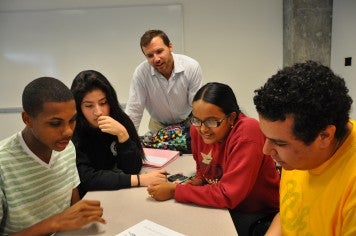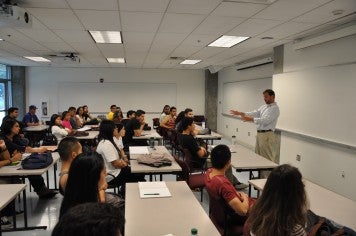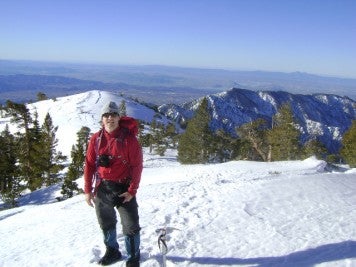A few years ago, the Department of Chemistry at the University of California, Riverside decided to increase the relevancy of its introductory chemistry courses and enhance student learning. One solution rose to the top: hire someone whose job would be to focus on the general chemistry program.
So in 2010, Jack F. Eichler joined the department as a lecturer with potential for security of employment — the equivalent of an assistant professorship.
Eichler, a member of the UCR Academic Senate, came to campus from Oxford College of Emory University, Ga., where he was an assistant professor. Prior to that, he was at Wichita State University, Kan., where he held a teaching postdoctoral appointment supported by the National Science Foundation.
At UCR, teaching takes up the bulk of Eichler’s time; the rest is spent working on scholarly activities related to instructional development and undergraduate research.
“My position is unique in that while teaching is my main focus, I get to do some research,” he said. “I was a tenure track faculty member at Oxford College, where I worked with undergraduates on research projects. Fortunately, I am able to do the same at UCR.”
Each quarter, Eichler teaches several sections of the “general chemistry sequence” — three rigorous courses that introduce undergraduate students first to chemistry concepts such as chemical bonding, electronic structure and chemical reactions, and later to nuclear and solid state chemistry. Most undergraduates in the College of Natural and Agricultural Sciences (CNAS) must take at least two of the courses in the sequence.
“Before I joined UCR, the Department of Chemistry had a lot of adjunct professors who taught general chemistry classes along with full-time faculty members,” Eichler explained. “It was felt that the students would benefit with an instructor who focused on teaching the general chemistry sequence. Now a good number of students take all three general chemistry courses with me, and they appreciate the continuity of working consistently with the same instructor.”
Jack Eichler addresses a section of freshmen enrolled in a general chemistry course.PHOTO CREDIT: UCR STRATEGIC COMMUNICATIONS.
Currently, Eichler is collaborating with Leonard Mueller, a professor of chemistry, and Richard Hooley, an assistant professor of chemistry, on a nearly $200,000 three-year grant related to the science, technology, engineering and mathematics (STEM) fields. Called the National Science Foundation Transforming Undergraduate Education in STEM, it focuses on developing new case study educational materials for implementation in foundation freshman and sophomore chemistry courses.
“The case studies connect traditional chemistry course content with other STEM fields through topics of civic interest and real-world cases — such as global warming and air quality,” said Eichler, the grant’s principal investigator. “The number of students who enter college with an interest in the STEM fields and proceed to earn a related degree is alarmingly low, particularly among underrepresented minorities. We expect this project will increase the success rate of minority students in the two-year chemistry sequence, and ultimately their retention in the STEM fields.”
Eichler is also the director of a project funded by a more than $140,000 three-year U.S. Department of Agriculture Higher Education Challenge grant aimed at engaging freshmen and sophomores in the agricultural sciences. Marylynn Yates, the dean of CNAS, and Cynthia Larive, the chair of the Department of Chemistry, are the project’s co-directors.
“To attract more undergraduates to academic disciplines related to agricultural science and better prepare them for agriculture-related professions, we have implemented, within CNAS, a new learning community of incoming freshmen who have a broad interest in agricultural chemistry, environmental science, environmental engineering, entomology, and plant biology,” Eichler said. “We will facilitate their engagement in experiential research and field trips.”
Most recently, Eichler has taken over the role of academic advisor to the Chemistry Club, a chartered student group on campus of about 25 members that is affiliated with the American Chemical Society.
Jack Eichler seen here on the summit of Mount San Gorgonio (just east of San Bernadino) in the spring of 2011.PHOTO COURTESY OF J. EICHLER.
“We plan to do an outreach program to get more involved with local high schools,” he said. “Members will attend the national meeting of the American Chemical Society and present their club accomplishments. We also will organize field trips and guest speakers, and offer advice on career opportunities.”
When he isn’t teaching, doing research or assisting with the Chemistry Club, Eichler spends much of his free time hiking. He has climbed the summit of Mount Whitney in the Sierra Nevada and last winter he scaled two volcanoes — one about 19,000 feet high and the other about 20,000 feet high — in Ecuador.
“It’s a hobby I greatly enjoy,” he said. “There’s nothing quite like making it to the top. That reward makes up for all the effort it takes to get there.”


